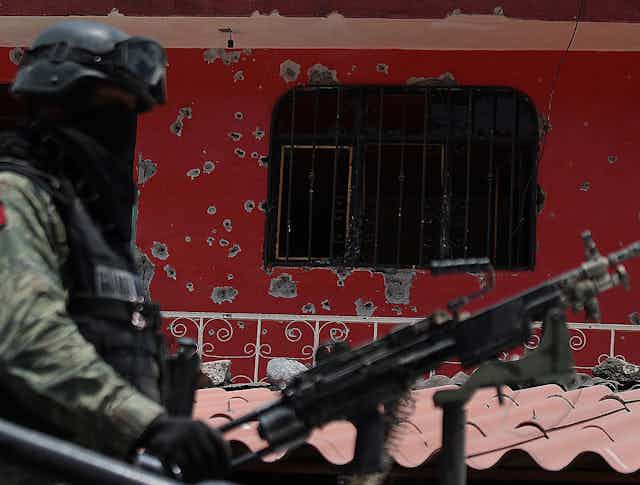The citizens of Iguala in the southern Mexican state of Guerrero, encountered several billboards hanging on different sites recently. They read:
People of Iguala, we ask you to please stay inside your home, we do not want chaos outside. You have to respect the lockdown, we will seriously hurt those who we catch outside.
This wasn’t the work of some over-zealous local government official. The messages were put up by the local narco cartel. This was not an isolated case: criminal gangs have also been imposing curfews in other Mexican states and Brazil and El Salvador.
States within states
During the coronavirus pandemic, governments have undoubtedly been the lead actors in imposing restrictions on their populations while financially supporting individuals and firms for lost income. But in numerous countries, governments have very limited capacity or have to live with mafia-type organisations. These groups differ from standard criminal operations because they act like a state within a state.
As researchers Gianluca Fiorentini and Sam Pelzman wrote in 1995 of these groups, they “perform inside [their] territory those activities that typically characterise a collective decision-maker’s intervention on the economy: levying of taxes, coercive provision of public goods, and regulation of private agents through non-fiscal tools”. Little has changed since.
Read more: El Chapo is no Robin Hood – but social bandit myth still endures in Latin America
Mafia outfits have lost profits in many of their core businesses during the pandemic, such as drug dealing, human trafficking and gambling. But they still have plenty of money from previous years’ activities to be able to step in with support. Besides imposing curfews, they have been providing various public services. These vary hugely around the world, but there are some common trends.
For one thing, these oranisations have been providing free food and other essential goods to poor people who are running out of cash. A few weeks into the Italian lockdown, for example, this was happening in Naples and Palermo.
In Naples, the local camorra crime gang has even been making home food deliveries to people along with illegal drugs. This comes as no surprise in a region where the state was slow to provide help even to those who are entitled to such benefits, never mind the unentitled millions who earn a living in everything from agricultural labour to domestic work but are not tax-registered. Criminal groups in southern Italy have also been providing financial help to individuals, with gifts of sometimes €300 or €400 at a time (£266 to £354).
In Mexico, the criminal cartels have also been providing food to the poorest in the states of Guerrero, Michoacán, Tamaulipas and Guanajuato. They seem to take marketing more seriously than their Italian counterparts. The Gulf cartel of north-east Mexico, for example, has been handing out boxes of food and hand sanitiser sealed with a sticker bearing its name and logo. Meanwhile, such has been the shortage of health supplies in parts of Mexico that some hospitals have even been seeking the help of the cartels to procure the necessary equipment.
Central Mexico

Organised crime groups have also been delivering essential goods in Colombia, South Africa and Japan. In Japan, for instance, the yakuza distributed masks and toilet paper when they were scarce in supermarkets.
In Brazil, at a time when President Jair Bolsonaro has been underplaying the severity of the pandemic, gangs have reportedly been offering hand sanitiser to people in the favelas. Such groups can easily access these goods by exploiting their business networks and trafficking routes.
Business backing
Criminal groups are also providing financial help to struggling local businesses. One example is the ‘ndrangheta, the strongest mafia group in Italy, which is offering loans at interest rates lower than the local banks. These loans are primarily aimed at the likes of small businesses in construction and hospitality, who can’t access credit from banks but urgently need liquidity. The ‘ndrangheta and similar groups have plenty of funds to make available.

Mexican criminal groups are also giving out loans to small businesses. No doubt the coronavirus response from President López Obrador is an added incentive: he has been refusing to borrow to provide a stimulus package, while continuing the country’s austerity drive – despite protests from many Mexicans.
Yet support can work both ways. The huge amount of money that some governments are injecting into the economy will provide optimal opportunities for fraudulent business claims and the like. The sight of mafia bosses in Italy being released from jail to protect them from coronavirus is only going to help these groups to take advantage.
Without a doubt, the help that mafia-type organisations are offering to households and firms will come at a high cost for many countries. The criminals are trying to gain political capital and extend control over their territory. When the crisis is over, they will ask for favours in return, such as money laundering or protection from the police. And a higher unemployment rate will tempt more people to join their ranks to secure stable earnings.
For the time being, the governments of countries where these mafias operate must not only deal with the coronavirus but limit the advancement of these groups at the same time. This is an additional important reason for supporting the general public at this difficult time, even if there may be no perfect solution to groups that have been entrenched for many years.

